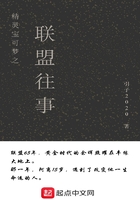"Or as long as I stay. He is an accommodating lover, and will make an equally accommodating husband for his wife's friend some day!" remarked Bigot laughingly.
Angelique's eyes flashed out fire, but she little knew how true a word Bigot had spoken in jest. She could have choked him for mentioning her in connection with De Pean, but remembering she was now at his mercy, it was necessary to cheat and cozen this man by trying to please him.
"Well, if you must go, you must, Chevalier! Let me tie that string," continued she, approaching him in her easy manner. The knot of his cravat was loose. Bigot glanced admiringly at her slightly flushed cheek and dainty fingers as she tied the loose ends of his rich steinkirk together.
"'Tis like love," said she, laughingly; "a slip-knot that looks tied until it is tried."
She glanced at Bigot, expecting him to thank her, which he did with a ****** word. The thought of Caroline flashed over his mind like lightning at that moment. She, too, as they walked on the shore of the Bay of Minas had once tied the string of his cravat, when for the first time he read in her flushed cheek and trembling fingers that she loved him. Bigot, hardy as he was and reckless, refrained from touching the hand or even looking at Angelique at this moment.
With the quick perception of her *** she felt it, and drew back a step, not knowing but the next moment might overwhelm her with an accusation. But Bigot was not sure, and he dared not hint to Angelique more than he had done.
"Thanks for tying the knot, Angelique," said he at length. "It is a hard knot, mine, is it not, both to tie and to untie?"
She looked at him, not pretending to understand any meaning he might attach to his words. "Yes, it is a hard knot to tie, yours, Bigot, and you do not seem particularly to thank me for my service. Have you discovered the hidden place of your fair fugitive yet?" She said this just as he turned to depart. It was the feminine postscript to their interview.
Bigot's avoidance of any allusion to the death of Caroline was a terrible mark of suspicion; less in reality, however, than it seemed.
Bigot, although suspicious, could find no clue to the real perpetrators of the murder. He knew it had not been Angelique herself in person. He had never heard her speak of La Corriveau.
Not the smallest ray of light penetrated the dark mystery.
"I do not believe she has left Beaumanoir, Bigot," continued Angelique; "or if she has, you know her hiding-place. Will you swear on my book of hours that you know not where she is to be found?"
He looked fixedly at Angelique for a moment, trying to read her thoughts, but she had rehearsed her part too often and too well to look pale or confused. She felt her eyebrow twitch, but she pressed it with her fingers, believing Bigot did not observe it, but he did.
"I will swear and curse both, if you wish it, Angelique," replied he. "Which shall it be?"
"Well, do both,--swear at me and curse the day that I banished Le Gardeur de Repentigny for your sake, Francois Bigot! If the lady be gone, where is your promise?"
Bigot burst into a wild laugh, as was his wont when hard-pressed.
He had not, to be sure, made any definite promise to Angelique, but he had flattered her with hopes of marriage never intended to be realized.
"I keep my promises to ladies as if I had sworn by St. Dorothy," replied he.
"But your promise to me, Bigot! Will you keep it, or do worse?" asked she, impatiently.
"Keep it or do worse! What mean you, Angelique?" He looked up in genuine surprise. This was not the usual tone of women towards him.
"I mean that nothing will be better for Francois Bigot than to keep his promise, nor worse than to break it, to Angelique des Meloises!" replied she, with a stamp of her foot, as was her manner when excited.
She thought it safe to use an implied threat, which at any rate might reach the thought that lay under his heart like a centipede under a stone which some chance foot turns over.
But Bigot minded not the implied threat. He was immovable in the direction she wished him to move. He understood her allusion, but would not appear to understand it, lest worse than she meant should come of it.
"Forgive me, Angelique!" said he, with a sudden change from frigidity to fondness. "I am not unmindful of my promises; there is nothing better to myself than to keep them, nothing worse than to break them. Beaumanoir is now without reproach, and you can visit it without fear of aught but the ghosts in the gallery."
Angelique feared no ghosts, but she did fear that the Intendant's words implied a suggestion of one which might haunt it for the future, if there were any truth in tales.
"How can you warrant that, Bigot?" asked she dubiously.















